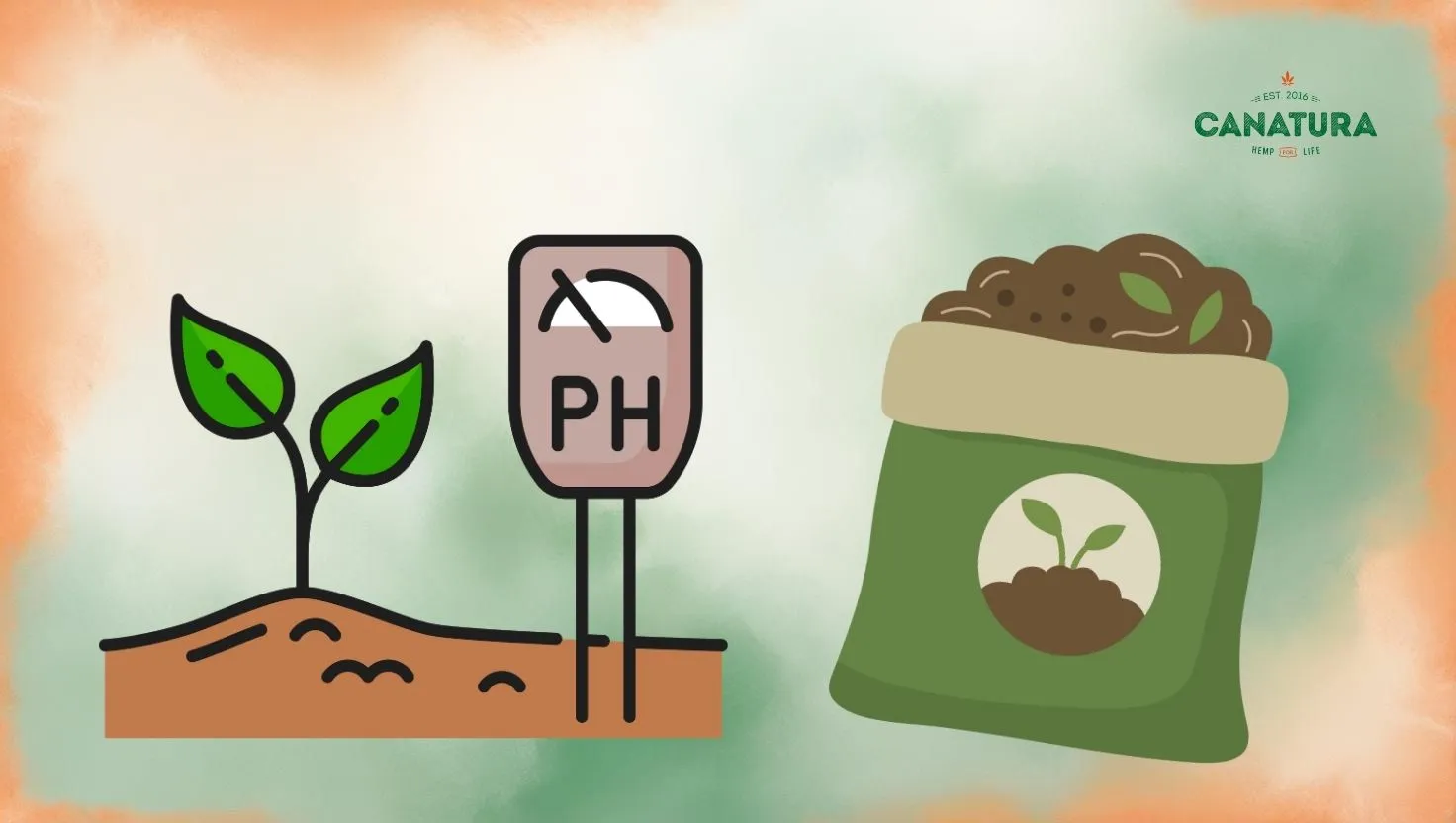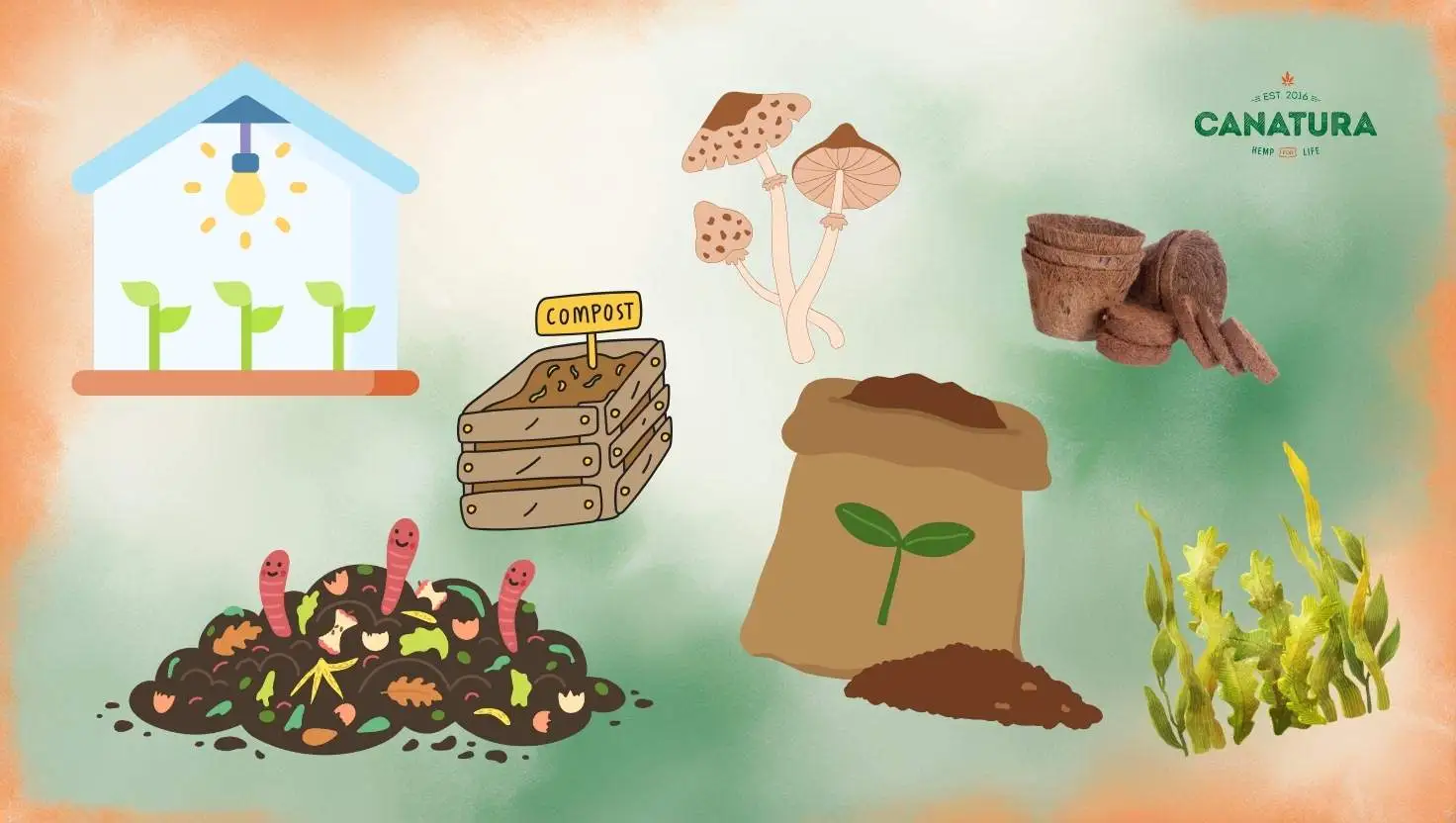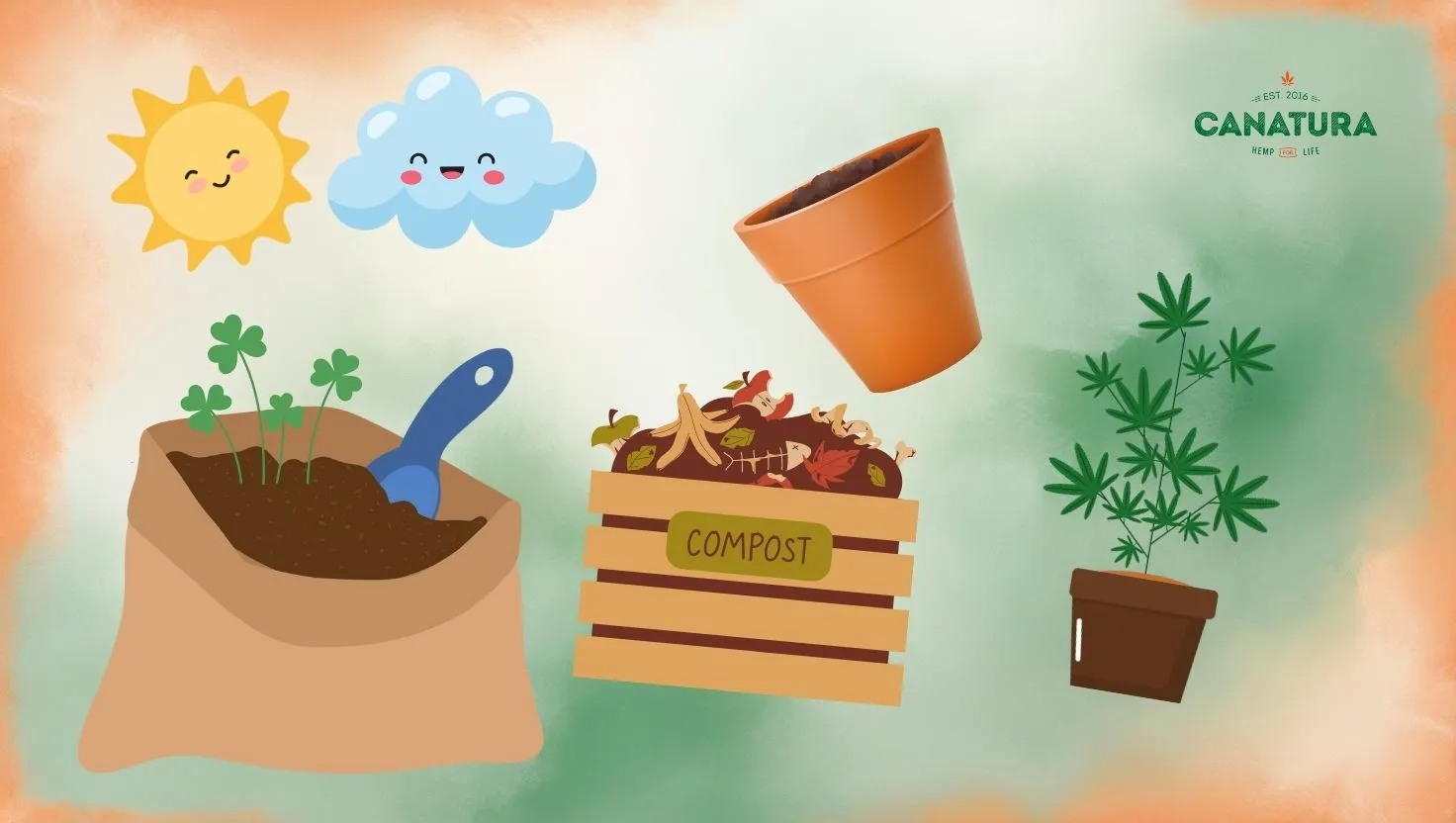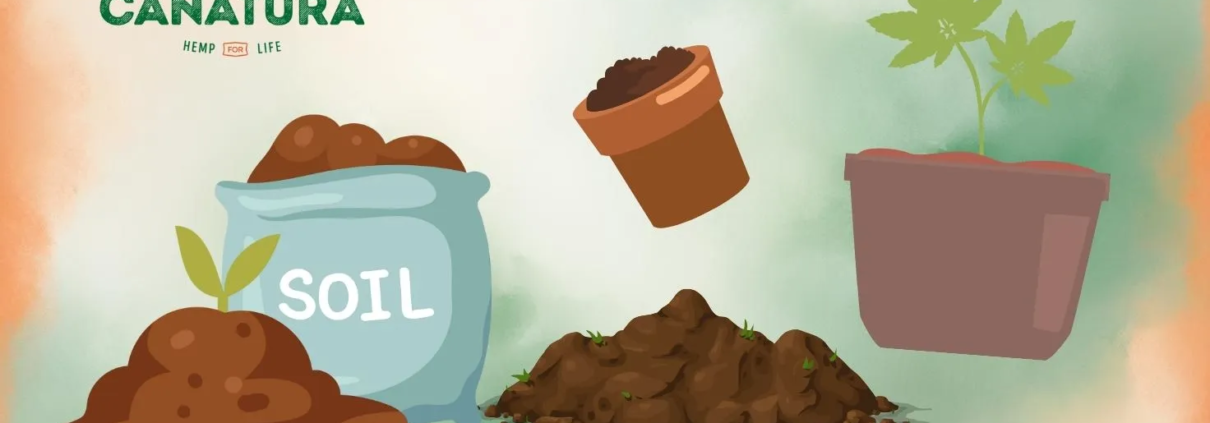The best soil (medium) for growing cannabis
- What is the best soil for growing cannabis?
- What soil do growers recommend for indoor cannabis plants?
- What soil do growers recommend for outdoor cannabis plants?
- Conclusion
- FAQ
What soil is best for growing cannabis?
Technical or industrial cannabis (Cannabis sativa L. varieties with minimal THC content) has similar soil requirements to other types of cannabis. Growers must ensure optimal soil structure and composition to achieve high yields of fibre, seeds or CBD.
In general, hemp thrives in a nutrient-rich substrate that is light, well-aerated and retains adequate moisture without becoming waterlogged.
Hemp has specific requirements that even depend on the sex of the plant. Growers who understand the needs of the plant can create the ideal environment for its growth. That is why hemp soil is a specially blended mixture – designed to help hemp thrive in every way.
Although hemp is a relatively hardy plant, soil quality plays a crucial role in its health, growth and yield. The right soil not only affects the crop itself, but also the efficiency of cultivation and the environment.
When choosing soil, a number of factors must be considered – from the specific variety to the conditions in which the plant will grow (indoor, outdoor). In general, cannabis likes loamy soil that is easy for roots to penetrate.
Outdoor varieties in particular tend to be more demanding to grow. If the grower chooses the right soil, they will promote a strong root system and vigorous growth, even without excessive fertilisation and watering.
Why do growers monitor soil reaction (pH)?
Growers report that the right soil pH is crucial for cannabis. Although cannabis tolerates a pH range of approximately 5.0–7.5, the plant thrives best in slightly acidic to neutral soil with a pH between 6.0 and 7.0 (within this range, it can effectively absorb the nutrients necessary for growth and health).
If the pH is outside this range, the plants suffer from nutrient deficiencies, even if the nutrients are present in the soil. Therefore, growers regularly check the pH using a reliable pH meter, with lime increasing the pH and sulphur decreasing it. Balance is essential to prevent the plants from going into shock.

What soil do growers recommend for indoor cannabis plants?
Growing cannabis indoors allows growers to have full control over light, temperature, humidity and nutrients, i.e. the overall development of the plants. The key to success is a high-quality substrate that creates the ideal environment for roots and promotes healthy growth.
Basic substrate composition:
- Lime-free mixtures are most commonly used.
- A proven ratio of 1:1:1 (1 part peat or coconut fibre + 1 part perlite + 1 part compost), or, for example, a mixture of peat and perlite in a ratio of 7:3 supplemented with a small amount of coconut fibre.
- Peat / coconut fibre: retains moisture.
- Perlite: ensures airiness and water drainage.
- Compost: provides nutrients and humus.
- The optimum pH is around 6.0–7.0.
Growers often add other ingredients to improve the substrate:
- Vermiculite (5–10%): retains water, ideal in combination with perlite
- Organic additives: earthworm humus, guano, seaweed – for nutrients and microbial life
- Mycorrhizal fungi: support roots and nutrient absorption
These additives increase the fertility of the substrate and promote microbial activity, which benefits cannabis growth.

What soil do growers recommend for outdoor cannabis plants?
Growing cannabis outdoors means that the plant takes advantage of natural conditions – sun, rain and soil. Compared to indoor methods, it is less expensive, but at the same time more demanding in terms of choosing the right location and quality soil. It is the soil that plays a crucial role in how the plant will grow and what the yield will be.
Ideal soil composition:
- Medium-heavy (loamy) soil with a balanced texture – i.e. approx. 40% sand, 40% silt and 20% clay. Such soil is well aerated and drained, but at the same time retains water and nutrients well in the soil profile.
- The optimal pH is around 6.0–7.0.
Cannabis needs sufficient nitrogen, phosphorus, potassium and micronutrients. To improve the fertility and structure of the plant, growers add compost, manure or green manure (e.g. clover).
For heavy soils, organic matter (compost) or sand is added and deeply tilled. Organic materials help aerate the soil, increase the humus content and replenish nutrients. Compost or manure thus improve both the texture and fertility of the soil for hemp.

Conclusion
Cannabis grows best in loose, nutrient-rich soil with a balanced pH of around 6–7.0.
Light mixtures of coconut fibre, perlite and compost are suitable for indoor cultivation. Outdoor plants thrive in loamy soil with good drainage. Growers achieve the best results by regularly monitoring the pH, loosening the soil, mulching and adding organic matter.
FAQ
Take a look at other questions that interest you most in relation to this topic.
How do growers care for the soil?
To prevent the soil from turning into impermeable concrete, growers must regularly loosen it. This improves aeration, promotes healthy root growth and prevents the accumulation of moisture that could cause rot.
Growers also mulch, which involves adding a layer of mulch (e.g. straw, leaves or grass) to the soil surface. This helps retain moisture, suppress weeds and protect the soil from overheating. Over time, the mulch layer also enriches the soil with organic matter.
How do growers know if their soil is unsuitable?
Slow growth, pale or yellowing leaves, twisting, or dark spots on the plant often indicate that there is a problem with the soil structure, a lack of nutrients or an unsuitable pH. Growers will test the soil and, if necessary, adjust the fertiliser or pH.
Do growers always use ready-made substrates or do they mix their own?
In general, ready-made mixtures save growers time and are well balanced. However, some growers create their own mix, which contains coconut fibre, perlite, vermiculite, compost and, if necessary, worm manure.
To adjust the pH, they add a little lime powder or dolomitic lime. The resulting mixture is loose, rich in nutrients and well balanced.
Can growers use standard garden fertiliser?
Yes, but first and foremost, they must choose a high-quality gardening substrate – airy with an admixture of perlite or coconut fibre for better drainage and aeration of the roots, known as a light mix.
How often do growers fertilise cannabis?
The frequency of fertilisation depends on the type of fertiliser and the stage of growth. Organic fertilisers are usually applied once every 2–3 weeks, mineral fertilisers more often. During the growth phase, the plant mainly needs nitrogen, while during the flowering phase it needs phosphorus and potassium.
Sources:
- thcfarmer.com/threads/you-favourite-simple-soil-recipe.146147/
- britishhempalliance.co.uk/hemp-farming
Author: Patricie Mikolášová
Photo: AI
The content of this article is intended for informational purposes only. The information provided should not be construed as legal or medical advice. Readers are advised that the cultivation, possession, and use of cannabis may be subject to legal restrictions and regulations in various jurisdictions. Specifically, the cultivation of cannabis plants that contain 0.2% or more of tetrahydrocannabinol (THC) or other psychoactive substances may be considered illegal and subject to criminal penalties, depending on the country and its specific laws.
This article is intended for those interested in the ethnobotanical and collecting aspects of cannabis seeds. Any mention of cultivation or usage is for educational and informational purposes only and should not be interpreted as encouragement or endorsement to engage in illegal activities.
It is the reader’s responsibility to understand and comply with the laws and regulations governing cannabis in their respective country or region. The authors and publishers of these articles do not assume any responsibility for the actions of readers who choose to cultivate, possess, or use cannabis in violation of local laws. Furthermore, while we strive to provide accurate and up-to-date information, we do not guarantee the germination or any other characteristics of cannabis seeds discussed in these articles. The sale of cannabis seeds and related products is intended for adults over 18 years of age.
By accessing and reading these articles, you acknowledge and agree to this Disclaimer.


